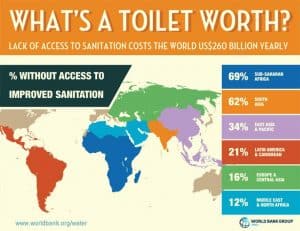 A toilet is a necessary item we all use multiple times a day, and something we typically choose not to discuss. After all, who wants to talk about toilets — and why we need them. But that’s just what World Toilet Day aims to change.
A toilet is a necessary item we all use multiple times a day, and something we typically choose not to discuss. After all, who wants to talk about toilets — and why we need them. But that’s just what World Toilet Day aims to change.
 On November 19, 2001, former construction industry executive Jack Sims founded the World Toilet Organization, and the inaugural World Toilet Summit was held in Singapore. Every year since then, we have celebrated World Toilet Day in an effort to bring awareness of the global santitation crisis, and to eliminate the taboo surrounding the subject of toilets and sanitation. Since its inception, World Toilet Day has gained the notice and support of many organizations in the private sector, civil society, and the international community, and was officially recognized by the United Nations in 2013.
On November 19, 2001, former construction industry executive Jack Sims founded the World Toilet Organization, and the inaugural World Toilet Summit was held in Singapore. Every year since then, we have celebrated World Toilet Day in an effort to bring awareness of the global santitation crisis, and to eliminate the taboo surrounding the subject of toilets and sanitation. Since its inception, World Toilet Day has gained the notice and support of many organizations in the private sector, civil society, and the international community, and was officially recognized by the United Nations in 2013.
Prior to the inception of World Toilet Day, the less than glamorous subject of sanitation received very little attention, and was therefore rarely prioritized on global development agenda. World Toilet Day aims to educate the international community on the risks associated with lack of sanitation as well as the urgency of implementing global sanitation. With that in mind, let’s look at some global sanitation statistics.
Global Sanitation Fast Facts
 1 in 3 people — 2.5 billion of the world’s total population — lacks access to a clean and safe toilet
1 in 3 people — 2.5 billion of the world’s total population — lacks access to a clean and safe toilet- 1 billion people practice open defecation
- 90% of diarrhea cases are caused by feces-contaminated food or water
- Diarrhea results in the deaths of more than 700,000 children under the age of five every year
- About 2,000 young children die as a result of diarrhea every single day
- Every $1 spent on sanitation brings $5.50 in return by keeping people healthy and productive
- Economic losses from lack of access to sanitation amount to an estimated $260 billion annually, more than the entire gross domestic product of Chile
- Feces are responsible for more than 50% of the nine million preventable child deaths each year
- Toilets have added 20 years to the human lifespan over the past 200 years
- If everyone had access to a toilet, the estimated annual gain in economic productivity would be $225 billion
Lack of sanitation not only produces staggering health and economic consequences, but also has serious social implications, particularly for women and girls. Women who lack access to safe, private sanitation facilities are exponentially more susceptible to harassment and violence, and many girls who reach the age of puberty drop out of school if their school lacks adequate sanitation facilities. In general, children lose approximately 272 million school days due to diarrhea each year, with girls losing even more school days due to their familial role as water-gatherers in developing countries.
What We Can Do

Fortunately, the World Toilet Organization and World Toilet Day have brought the sanitation crisis into the global spotlight, attracting the support of several high-profile charitable organizations such as charity: water, Water For People, WaterAid, and water.org, co-founded by Hollywood superstar and Massachusetts native Matt Damon. All of the above charities receive excellent ratings from Charity Navigator, with high percentages of their assets going directly to program expenses. In addition, the Bill & Melinda Gates Foundation has made global sanitation a targeted focus of its charitable works, with the Foundation committing $370 million to water and sanitation issues as well as hosting the Reinvent the Toilet Challenge in an effort to bring safe — as well as sustainable — sanitation to the global community.
In Conclusion
Global sanitation and hygiene are of paramount importance to the health and safety of billions of people, and also to the health of the global economy and environment. While the subject of sanitation has become less taboo and has gained more exposure through World Toilet Day and various charitable organizations over the past 14 years, we still have a long way to go. We can start by spreading the word through social media, news outlets, and word of mouth, and by supporting the charities that work so hard to provide safe, private sanitation to the entire global community. Together we can help bring health, safety, and dignity to the 1 in 3 people who still lack access to a basic toilet.
